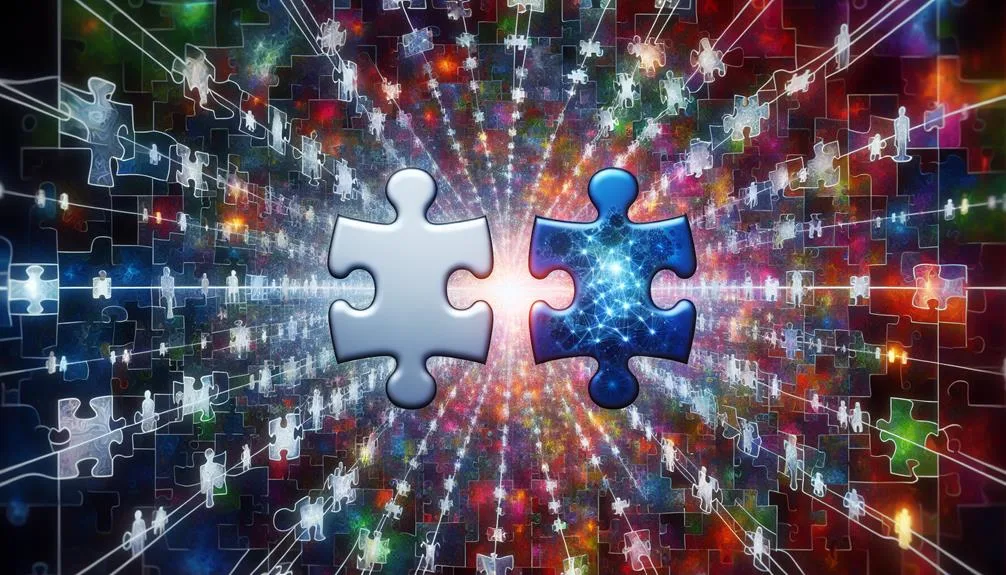Just as Alice tumbled down the rabbit hole into a world that defied her expectations, I've found myself questioning the traditional narrative of monogamy that's been deeply ingrained in society.
It's a journey that's taken me from accepting widely held beliefs to exploring the rich tapestry of human relationship dynamics. The evidence I've unearthed along the way—ranging from the practices of our primate cousins to the historical documentation of human societies—suggests that the conventional model of monogamy may not be the only natural or desirable option.
This exploration has led me to ponder: if the foundations of our relationship norms are so deeply flawed, what alternatives lie beyond the horizon, waiting to be discovered?
Key Takeaways
- Monogamy is not an inherent human trait; historical and biological evidence suggests a more complex sexuality.
- Ethical non-monogamy offers a model for embracing human capacities for love and connection beyond societal norms.
- Effective communication and emotional readiness are crucial for navigating the challenges and benefits of non-monogamous relationships.
- Rethinking relationship dynamics allows for more authentic expressions of love, challenging traditional norms and encouraging personal growth.
Evolution of Human Monogamy
Despite widespread belief, monogamy isn't a natural or ancient trait ingrained in human behavior, as evidenced by the ubiquitous transgressions against it across cultures. Delving into evolutionary patterns and cultural shifts reveals a complex narrative. Humans, like our primate cousins, display a variety of mating systems, and strict monogamy is rare in the animal kingdom. This suggests that our societal leanings toward monogamy are more a product of recent cultural evolution than an inherited biological imperative.
The insistence on monogamy as the norm overlooks the adaptive flexibility humans have shown in forming relationships. By critically examining these patterns, it becomes apparent that our understanding of human sexuality and partnership is far more nuanced than the binary of monogamy versus non-monogamy suggests.
Relationship Dynamics Over Time
Reflecting on the evolution of human monogamy reveals that our relationship dynamics have continually adapted over time, highlighting a shift towards more diverse forms of partnerships. This adaptation isn't just about the acceptance of evolving partnerships but also about acknowledging the changing dynamics within these relationships.
Historically, societal norms dictated a rigid framework for partnerships. However, as we've progressed, there's been a noticeable shift towards embracing a variety of relationship structures. This evolution reflects a deeper understanding of human desires and the complexity of emotional connections.
It's critical to observe how these changes challenge traditional views on monogamy and push us towards a more inclusive understanding of partnership. The transformation in relationship dynamics underscores a broader societal shift towards valuing individual choice and diversity in personal connections.
Exploring Non-Monogamous Pathways

In this exploration of non-monogamous pathways, we confront the complex reality that traditional models of monogamy no longer fully capture the diversity of human relationships. Delving into this topic, it's essential to consider:
- The potential for polyamorous exploration to catalyze emotional growth
- How non-monogamous connections challenge and redefine personal boundaries
- The necessity of clear communication in navigating these relationships
- The role of self-awareness in identifying one's comfort with various relationship dynamics
- The importance of mutual respect and consent in all interactions
This analysis reveals that non-monogamous pathways, when approached with mindfulness and intention, offer a viable alternative that can facilitate profound personal development and a deeper understanding of one's desires and boundaries.
Building Ethical Relationships
Building on the foundation of exploring non-monogamous pathways, it's crucial to address how we can forge ethical relationships that respect and honor all parties involved. Ethical communication and trust building are the bedrock of these relationships. In my observation, without clear, honest dialogue, the structure of any relationship, especially non-monogamous ones, is prone to collapse. Trust isn't a given; it's earned through consistency and integrity in our actions and words.
Critically speaking, the challenge lies in navigating our own biases and fears. We must be vigilant in our efforts to understand and articulate our needs, boundaries, and expectations. Ethical relationships require a level of self-awareness and accountability that's often demanding but ultimately rewarding. It's a continuous journey of growth, understanding, and, most importantly, respect for the autonomy of everyone involved.
Embracing a Non-Monogamous Model

Embracing a non-monogamous model requires a deliberate shift in perspective and a dismantling of deeply ingrained societal norms. This journey into relationship exploration and emotional growth isn't just about diversifying partners; it's a profound avenue for self-discovery within non-traditional partnerships.
- Personal Growth: Non-monogamy encourages introspection and emotional maturity.
- Communication Skills: Vital for navigating complexities and maintaining clarity.
- Breaking Conventions: Challenges societal expectations and norms.
- Flexibility and Freedom: Offers a customizable approach to relationships.
- Self-Discovery: Facilitates understanding of one's desires and boundaries.
Critically, this path isn't a panacea for relationship woes but a nuanced exploration that demands honesty, respect, and a willingness to confront uncomfortable truths about oneself and society.
Mindful Relationship Practices
Mindful relationship practices demand a conscious effort to navigate the complexities of human connections with empathy and awareness. It's a journey that requires deep self-reflection, a crucial element for fostering emotional growth within ourselves and our relationships.
As I delve into these practices, I've observed that they're not just about understanding our partners better but also about gaining insights into our own behaviors and motivations. This understanding allows us to approach our connections more thoughtfully, reducing reactive patterns that often lead to conflict.
Redefining Relationship Norms

In rethinking relationship norms, we find that societal expectations often constrain our understanding of love and partnership, limiting the diverse ways humans can connect and build meaningful bonds. By challenging traditions and embracing diversity in how we define relationships, we can uncover a more authentic expression of what it means to love and be loved.
- The historical context of monogamy reveals it's not a natural human condition.
- Adultery and non-monogamy exist across cultures, challenging the idea of a universal relationship model.
- Embracing diversity in relationships allows for a broader understanding of love and commitment.
- Challenging traditions offers a pathway to redefine what makes a relationship fulfilling.
- Ethical non-monogamy emphasizes communication and consent, reshaping how we view trust and jealousy.
Frequently Asked Questions
How Do Financial Considerations and Responsibilities Impact Non-Monogamous Relationships Compared to Traditional Monogamous Ones?
In non-monogamous relationships, I've observed that financial considerations and responsibilities demand unique investment strategies, ensuring everyone's emotional security. This contrasts with traditional monogamy, where financial planning often aligns with societal norms and expectations.
In What Ways Do Non-Monogamous Relationships Address or Struggle With Parental Responsibilities and Child-Rearing Practices?
In exploring the garden of non-monogamous relationships, I've noticed they often face hurdles in child-rearing due to social stigma and lack of community acceptance, despite striving for a supportive and diverse upbringing environment.
How Do Legal Systems Worldwide Accommodate or Challenge Non-Monogamous Relationships, Especially Regarding Marriage, Inheritance, and Child Custody?
I've observed that legal systems rarely accommodate non-monogamous relationships, often lacking cultural acceptance. This impacts marriage, inheritance, and child custody, complicating tax implications and underscoring a critical need for legal and societal paradigm shifts.
What Are the Psychological Impacts on Children Raised in Non-Monogamous Family Structures Versus Those in Monogamous Ones?
I've noticed children in non-monogamous families often develop varied attachment styles and potentially greater emotional resilience. It's critical to understand how these dynamics influence their psychological well-being compared to those in monogamous settings.
Navigating non-monogamy, I've found cultural taboos and personal identity often clash with spiritual beliefs. Analyzing this, it's clear that reconciling these aspects requires critical self-reflection and open dialogue to overcome societal norms and expectations.
Conclusion
In exploring the evolution of monogamy, I've challenged norms, unearthed the complexities of human relationships, and advocated for the acceptance of non-monogamous pathways.
By critically analyzing our inherited relationship dynamics, I've realized that ethical, sustainable partnerships aren't confined to monogamy. Embracing diverse models allows for individual growth and emotional readiness.
As we redefine relationship norms and practice mindfulness, we pave the way for richer, more authentic connections. Thus, it's crucial to question, understand, and ultimately, embrace the multiplicity of human love and partnership.

